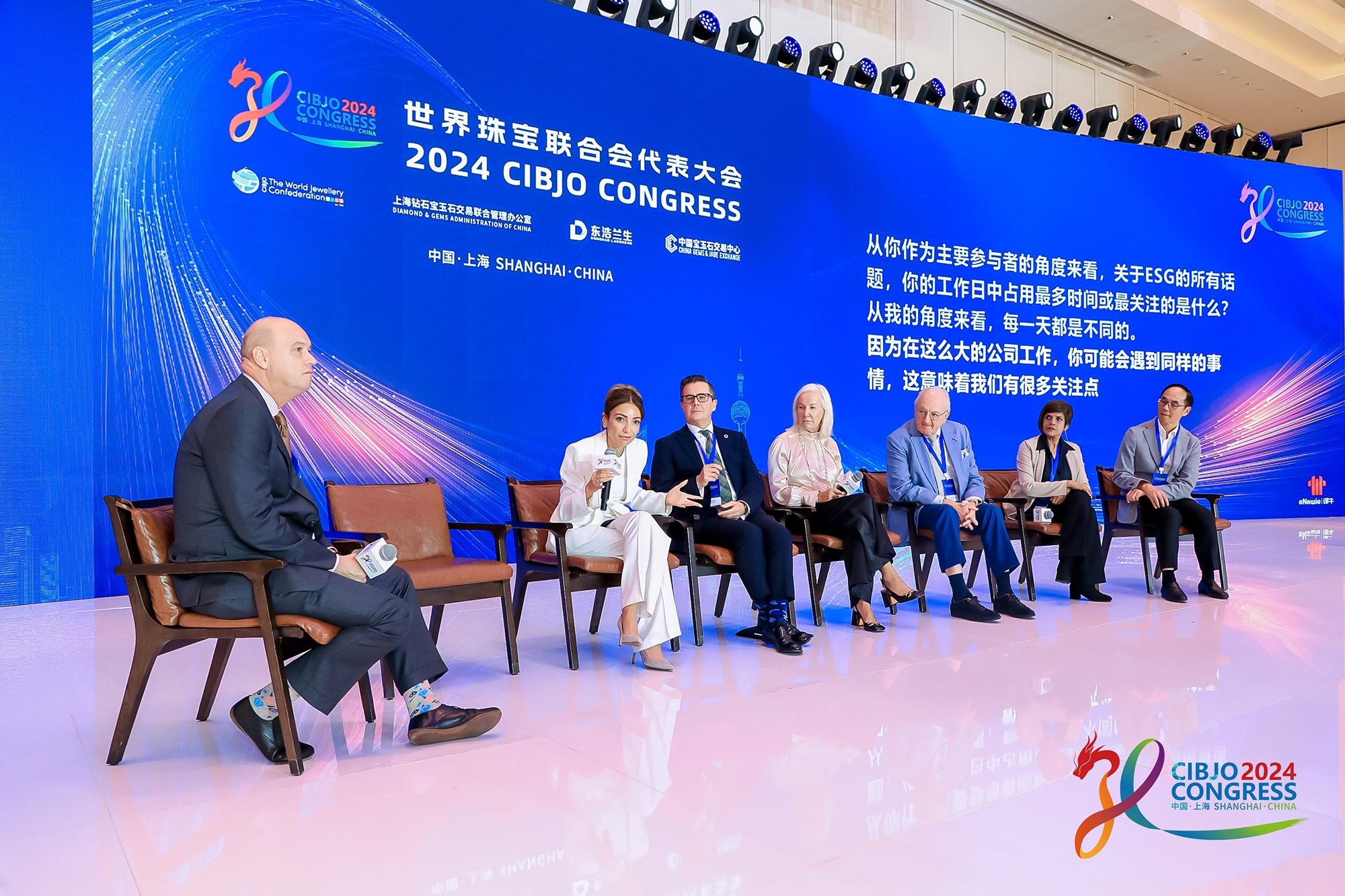Major industry players urge accelerated action
by jewellery businesses on sustainability targets

The sustainable supply chain panel during the special session (from left) moderator Edward Johnson of Gemfields, Corporate Responsibility Director of Gemfields; Feriel Zerouki, Senior Vice-President of the De Beers Group and President of the World Diamond Council; John Mulligan, the Climate Change Lead and Director of Market Relations at the World Gold Council; Iris Van der Veken, Executive Director of the Watch & Jewellery Initiative 2030; Edward Asscher, Vice Chair of the Responsible Jewellery Council; Vaishali Banerjee, Managing Director of Platinum Guild India, and Kent Wong, Managing Director of Chow Tai Fook.
NOVEMBER 2, 2024
A special session on the first day of the 2024 CIBJO Congress Congress, featuring a blue ribbon panel of major industry players, urged accelerated action by jewellery businesses and partnerships to drive forward on meeting sustainable development goals.
A panel, which was moderated by Edward Johnson of Gemfields, Corporate Responsibility Director of Gemfields, the world’s largest coloured gemstone miner, included Kent Wong, managing director of the leading jewellery retailer Chow Tai Fook; Feriel Zerouki, Senior Vice-President of the De Beers Group and President of the World Diamond Council; Edward Asscher, Vice Chair of the Responsible Jewellery Council; John Mulligan, the Climate Change Lead and Director of Market Relations at the World Gold Council; Vaishali Banerjee, Managing Director of Platinum Guild India and Iris Van der Veken, Executive Director of the Watch & Jewellery Initiative 2030 (WJI 2030), which was co-founded by Cartier and the Kering group of luxury brands.
“Well-educated consumers in China are increasingly concerned about environment, social and governance issues,” Mr Wong said. “We need to deliver not only happiness to the consumer who buys our products, but also we need to contribute to the betterment of the world.”
Ms Zerouki called for the development of partnership and trust in transactional relationships, adding that consumers are increasingly demanding the highest standards.
Against a backdrop of sustainability targets that are presently falling short, she warned jewellery businesses that if they failed to deliver on pledges to build on sustainable development, they risked customers turning away from the industry.
”’Cancel culture’ is what we should be most worried about. If consumers think that your business is striving for the highest standards, but you are not, you will be cancelled,” Ms. Zerouki stated.
Ms Van Der Veken said that while we are experiencing uncertain times, the watch and jewellery industry is currently experiencing a pivotal shift, moving beyond its traditional focus on craftsmanship and design towards addressing evolving stakeholder expectations, particularly sustainability and transparency.
“Customers more and more are looking beyond creativity and design excellence to responsible sourcing of materials, carbon footprint reductions, nature and bio diversity impact, circularity and adherence to human rights and decent labour,” she said.
Mr. Johnson said he welcomed the latest EU due diligence regulations that will force players to take greater responsibility of their supply chain management.
Ms. Van der Veken also referred to the acceleration of new regulations that have a major impact on the value chain.
“Companies need to invest in robust due diligence,” she said, reinforcing the point of view of Mr Johnson.
“An example is the double materiality assessment, where companies need to look not only at the impacts and risks on their business but also how they impact society and the environment – the outward vision,” she explained.
“This double materiality assessment mandated by the European Union’s CSDDD is something that is going to become a ‘must do’ in the coming years, even to [smaller] companies that are not in scope of the CSDDD,” she said.
But Ms. Van der Veken added, “These are complex topics. We should never forget the suppliers, the SMEs that are at the heart of our industry: they need to be included on this journey.”
CIBJO President Gaetano Cavalieri said that action to achieve more sustainable development was fundamentally aimed at protecting consumers.
“The confidence of the consumer is the most important thing,” he said.
Gender empowerment was a vital part of moves in the watches and jewellery industry towards greater sustainable development, Ms. Van der Veken stated.
“Women’s rights are everyone’s business, especially in our industry, an industry of craftsmanship, beauty and emotions,” she said.
“Our partnership with UN Women is a true example how collaboration enables action on the ground. We are not reinventing the wheel.
“We work with the Women Empowerment Principles Framework. We have different learning pathways from starters to leaders.
“It is really about building your business case. Diverse businesses perform better. Talent wants to work for a company that leads the way on diversity.
The time is now,” she stressed. “I invite all CEOs to sign the Women Empowerment Principles -WEPs as a starting point. Do your assessment and build a step-by-step plan. We are here to support you.”
